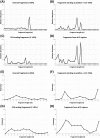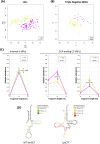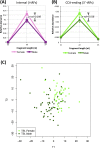Dissecting tRNA-derived fragment complexities using personalized transcriptomes reveals novel fragment classes and unexpected dependencies
- PMID: 26325506
- PMCID: PMC4694795
- DOI: 10.18632/oncotarget.4695
Dissecting tRNA-derived fragment complexities using personalized transcriptomes reveals novel fragment classes and unexpected dependencies
Abstract
We analyzed transcriptomic data from 452 healthy men and women representing five different human populations and two races, and, 311 breast cancer samples from The Cancer Genome Atlas. Our studies revealed numerous constitutive, distinct fragments with overlapping sequences and quantized lengths that persist across dozens of individuals and arise from the genomic loci of all nuclear and mitochondrial human transfer RNAs (tRNAs). Surprisingly, we discovered that the tRNA fragments' length, starting and ending points, and relative abundance depend on gender, population, race and also on amino acid identity, anticodon, genomic locus, tissue, disease, and disease subtype. Moreover, the length distribution of mitochondrially-encoded tRNAs differs from that of nuclearly-encoded tRNAs, and the specifics of these distributions depend on tissue. Notably, tRNA fragments from the same anticodon do not have correlated abundances. We also report on a novel category of tRNA fragments that significantly contribute to the differences we observe across tissues, genders, populations, and races: these fragments, referred to as i-tRFs, are abundant in human tissues, wholly internal to the respective mature tRNA, and can straddle the anticodon. HITS-CLIP data analysis revealed that tRNA fragments are loaded on Argonaute in a cell-dependent manner, suggesting cell-dependent functional roles through the RNA interference pathway. We validated experimentally two i-tRF molecules: the first was found in 21 of 22 tested breast tumor and adjacent normal samples and was differentially abundant between health and disease whereas the second was found in all eight tested breast cancer cell lines.
Keywords: Argonaute; human genome; mitochondrial tRNA; nuclear tRNA; tRNA fragment.
Conflict of interest statement
The authors declare they have no known conflicts of interest in this work.
Figures










References
-
- McCarthy JJ, McLeod HL, Ginsburg GS. Genomic medicine: a decade of successes, challenges, and opportunities. Science translational medicine. 2013;5:189sr184. - PubMed
-
- Blandino G, Fazi F, Donzelli S, Kedmi M, Sas-Chen A, Muti P, Strano S, Yarden Y. Tumor suppressor microRNAs: a novel non-coding alliance against cancer. FEBS letters. 2014;588:2639–2652. - PubMed
Publication types
MeSH terms
Substances
Grants and funding
LinkOut - more resources
Full Text Sources
Other Literature Sources

